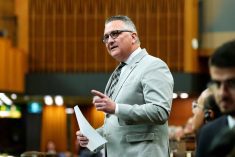By Andrea Hopkins
OTTAWA, April 26 (Reuters) – The front-runner in the race for the next leader of Canada’s Conservatives dropped out on Wednesday mere hours before the final televised debate, stunning party insiders.
Reality TV star and venture capitalist Kevin O’Leary said he was withdrawing from the 14-way contest to replace former Prime Minister Stephen Harper partly because his poor French language skills would be a hurdle in the French-speaking province of Quebec.
“I worked really hard and I couldn’t move the needle” in Quebec, O’Leary told reporters, standing next to Maxime Bernier, a former foreign minister whose candidacy O’Leary said he would support.
Read Also

Alberta harvest wrapping up: report
Harvest operations advanced to 96 per cent complete in Alberta as of Oct. 7, with only a few late-seeded cereal and canola fields remaining, according to the latest provincial crop report.
“It is the Florida of Canada,” O’Leary, who had struggled to learn French in time to boost his chances against Bernier, in reference to the province’s history of determining the outcome of Canada’s federal elections.
The Conservative Party of Canada will decide its new leader by May 27 to face Prime Minister Justin Trudeau of the Liberal Party in the 2019 national election.
“We are going to bring our forces together now so that we can win this race and then beat Justin Trudeau in 2019,” added Bernier, a Quebec libertarian who was neck-and-neck with O’Leary for much of the race.
O’Leary, who gained fame as a brusque dealmaker on the reality show “Shark Tank”, had no political experience and tenuous ties to the party but stole the spotlight because of an outsized media profile and the support of Canadians who said the businessman is a breath of fresh air.
Bernier, by contrast, is a second-generation politician and former foreign minister, a libertarian free-market champion whose previous brush with fame came when he was dumped from Harper’s cabinet after leaving confidential documents at the house of a girlfriend with links to organized crime.
Populist immigrant-skeptic Kellie Leitch and current members of Parliament Andrew Scheer and Erin O’Toole are also top contenders.
The vote will be decided by a preferential ballot that redistributes second-place votes until there is a winner.
With 14 candidates, including several safe and experienced mainstream members of parliament, analysts have been wary of predicting a winner because even internal opinion polls have a hard time figuring out how preferences will shake out on the third, fourth, or fifth ballot required for one candidate to win a majority of votes.
















